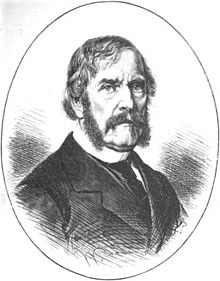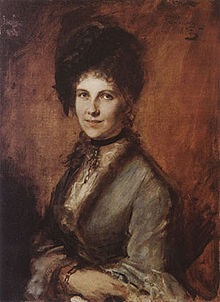Alexander von Schleinitz

Alexander Gustav Adolf Graf von Schleinitz (born December 29, 1807 in Blankenburg am Harz , † February 19, 1885 in Berlin ) was the Prussian Minister of State, Minister of Foreign Affairs 1858–1861 and from the end of 1861 until his death Minister of the Royal House .
Life
He came from an old Meissen noble family , which in the 16th century in the realm baron was raised, and was the son of Blankenburger provincial government and later Duke of Brunswick Minister of State Karl Ferdinand Freiherr von Schleinitz (1756-1837) and Barbara von Hochstetter (1768-1819 ). He was the brother of the Brunswick State Minister Wilhelm von Schleinitz (1794-1856) and the Prussian District President Julius von Schleinitz (1806-1865).
Until the revolution of 1848
Schleinitz studied law in Göttingen and Halle . In 1826 he became a member of the Corps Saxonia Halle . In 1828 he entered the Prussian civil service, in 1835 embassy attaché, 1840 Prussian Chamberlain, 1841 Lecturer Council at the Ministry of Foreign Affairs, resigned in July 1848 in the place of Heinrich Alexander von Arnim as Foreign Minister in the Ministry Camphausen , but gave up this post already after a few days and became the Prussian ambassador at the Hanoverian court, in Oldenburg, in Braunschweig and in Lippe-Detmold.
In May 1849 he negotiated peace with Denmark , in July 1849 again took over the portfolio of foreign affairs in the Brandenburg Ministry , but, since his German-patriotic sentiment did not agree with the course of Prussian politics, withdrew as a real secret on September 26, 1850 Rat returned from civil service and since then lived in Koblenz in close contact with the court of the Prince of Prussia and at Gebesee Castle in Thuringia.
New era and Bismarckian era
After the prince regent, later King and Emperor Wilhelm I , one of whose closest confidants he was in power, he took over the foreign affairs department in the “ New Era ” ministry appointed by him in November 1858 . The guidelines of his foreign policy were the attempt of an alliance with England and Austria, the maintenance of the European balance and a strengthening of the role of Prussia in Germany. The internal difficulties of the Liberal Ministry led him to resign in October 1861 and take over the Ministry of the Royal House , which he held until his death in 1885. Since then he has been intimate with Otto von Bismarck , who became Prime Minister of Prussia in 1862. Prussian liberals, but also Bismarck himself, viewed the house ministry at times as the "counter ministry" of Queen Augusta to the king's conservative government.
On the occasion of the golden wedding of the imperial couple, he and his wife were raised to the rank of count on June 11, 1879 .
Parliamentarians
From 1849 to 1852, in the second legislative period, Schleinitz was a member of the Erfurt constituency 1 in the Prussian House of Representatives . From 1859 to 1861 he was a member of parliament as a member of the constituency Bromberg 1. He was non-attached.
marriage
Alexander v. Schleinitz had been married to Marie von Buch (1842–1912), 35 years his junior, since 1865 , who, as Countess Schleinitz, became the most important Berlin salonnière of the imperial era. Together with "Mimi", as she was called, he campaigned for Richard Wagner and the Bayreuth Festival .
The couple had no children. The common, not preserved grave was on the Trinity Cemetery I in Berlin.
swell
- Schleinitz, Otto Freiherr v. (Ed.), From the papers of the family v. Schleinitz. With a preliminary remark by Fedor von Zobeltitz , Berlin 1904.
- Otto von Bismarck , correspondence with the Minister Freiherrn von Schleinitz , Stuttgart-Berlin 1905, new edition: Björn Bedey (Ed.), Severus, Hamburg 2011, (German Reich - Reich Chancellor Vol. I / IV), ISBN 978-3-86347- 189-7
literature
- Article Alexander Freiherr v. Schleinitz, Prussian Minister for Foreign Affairs. In: Illustrirte Zeitung , Vol. 36 (1861), p. 2.
- Article Count Alexander von Schleinitz, Royal Prussia. House Minister, died February 19, 1885. In: Illustrirte Zeitung , Vol. 84 (1885), pp. 239-240
- Bastian Peiffer, Alexander von Schleinitz and Prussian Foreign Policy 1858–1861 . Peter Lang Verlag, Frankfurt am Main / Berlin / Bern / Bruxelles / New York / Oxford / Vienna 2012, ISBN 978-3-631-62354-1 .
- Bärbel Holtz: Schleinitz, Alexander von. In: New German Biography (NDB). Volume 23, Duncker & Humblot, Berlin 2007, ISBN 978-3-428-11204-3 , p. 58 ( digitized version ).
- Entry in Meyer's encyclopaedic lexicon
- Entry in the German Biographical Encyclopedia
- Günther Cordes: Schleinitz, Alexander Graf von. In: Gerhard Taddey (Hrsg.): Lexicon of German history . Events, institutions, people. From the beginning to the surrender in 1945. 3rd, revised edition. Kröner, Stuttgart 1998, ISBN 3-520-81303-3 , p. 1122 f.
- Philipp zu Eulenburg , Schleinitz. In: From fifty years , Berlin 1923, pp. 35–39.
- Bernd Haunfelder : Biographical manual for the Prussian House of Representatives 1849–1867 (= manuals on the history of parliamentarism and political parties. Volume 5). Droste, Düsseldorf 1994, ISBN 3-7700-5181-5 , p. 224.
Web links
- Literature by and about Alexander von Schleinitz in the catalog of the German National Library
Individual evidence
- ↑ Kösener Corps lists 1910. 106 , 34
| personal data | |
|---|---|
| SURNAME | Schleinitz, Alexander von |
| ALTERNATIVE NAMES | Schleinitz, Alexander Gustav Adolf von (full name) |
| BRIEF DESCRIPTION | Prussian Minister of State, Minister for Foreign Affairs (1858–1861), since the end of 1861 Minister of the Royal House |
| DATE OF BIRTH | December 29, 1807 |
| PLACE OF BIRTH | Blankenburg am Harz |
| DATE OF DEATH | February 19, 1885 |
| Place of death | Berlin |


